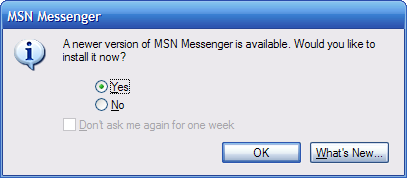
I just skimmed a great post on flow | state about software that auto-updates itself (or rather, software that does not).
I've been pondering this for quite some time. When Google released Google Talk, I was impressed that they had the balls to roll an auto-update clause into their EULA:
Automatic Updates. The Google Talk Client may communicate with Google's servers to check for available updates to the software, including bug fixes, patches, enhanced functions, missing plug-ins and new versions (collectively, "Updates"). During this process, the Client sends Google a request for the latest version information. By installing Google Talk, you hereby agree to automatically request and receive Updates from Google's servers.
The old me, unix geek and control freak (a subject that deserves and will receive a much longer post at some future time), was ticked off. It's my box, and I'll control what software gets installed when!
The new me, the one who wears the geeks do it in front of windows shirt and blogs in a wysiwyg text form (on my work blog, anyway - heh), was a bit enthused.
The decision to auto-update or not is a fight between three camps:
1. The control freak who wants complete control over his PC. He empties his recycling bin religiously, never auto-saves passwords in his web browser, and can give a rough estimate off the top of his head as to how much available hard disk space is available.
2. The average user. His stress level rises every time he sees a "Toast" in the system tray, or a dialog box like the one in this post. He wants to spend his time using his computer, not administering it.
3. The legal department. These are the people that decided it was a good idea to make Windows users press the PAGEDOWN key 10 times before they could accept the EULA and install previous versions of Windows.
In any event, my own opinion is to go the Google route and auto-update consumer software on consumer PCs, but perhaps respect a global auto-update setting that applies to all software, and is enabled by OEMs by default, but can be disabled by power users and businesses. Additionally, it'd be nice if apps would expose a UI option to disable auto-updating when enabled by default.
That said, forcing upgrades becomes a difficult proposition if the user is given the option to reject the update. Google only needs to support the most recent version of Google Talk, whereas Windows Live Messenger supports a long trail of previous releases.
Interesting food for thought...

No comments:
Post a Comment